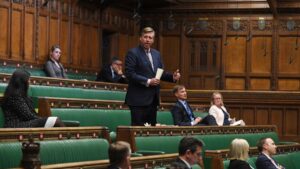An international group of scientists have signed an open letter supported by 44,000 members of the general public calling for lockdown to be ended in favour of a herd immunity strategy.
Titled the Great Barrington Declaration after the US town where it was written, it says that those who are not vulnerable “should immediately be allowed to resume life as normal” and that maintaining any lockdown policies would cause irreparable harm.
The authors, including the Oxford epidemiologist Sunetra Gupta, wrote: “The most compassionate approach that balances the risks and benefits of reaching herd immunity is to allow those who are at minimal risk of death to live their lives normally to build up immunity to the virus through natural infection, while better protecting those who are at highest risk.”
However Rupert Beale, an infectious disease expert at the Francis Crick Institute, said: “This declaration prioritises just one aspect of a sensible strategy — protecting the vulnerable — and suggests we can safely build up ‘herd immunity’ in the rest of the population. This is wishful thinking. It is not possible to fully identify vulnerable individuals, and it is not possible to fully isolate them.”
The letter was published as 14 Conservative MPs voted against the “rule of six” restriction last night and at least a dozen abstained as they called the measure a “massive intrusion into the liberty and private lives” of Britons.
During a bad-tempered debate Tory MPs questioned the rationale behind children not being exempt from the restriction, which bans social gatherings of more than six people.
The motion on the regulations was approved by 287 votes to 17, a majority of 270, with Labour abstaining. The rebel MPs in effect put the government on notice of a much bigger revolt over the 10pm curfew, which is due to come before the Commons for a vote next week.
Sir Graham Brady, leader of the 1922 Committee of Tory backbenchers, was one of those who voted against the rule of six. He said: “These rules are a massive intrusion into the liberty and private lives of the whole British people, and they’re having a devastating economic effect as well.”
Sir Christopher Chope said that the regulations were “brought in on a whim”, adding: “We’re talking about draconian powers which are restricting the liberty of the British citizen, we shouldn’t be introducing draconian powers without the strongest possible justification — I don’t think the minister has set out any justification in her remarks.”
In relation to giving police community support officers and local government employees the power to use reasonable force, Mark Harper, a former chief whip, said: “I, for one, am not comfortable as a former Home Office minister with the powers to use reasonable force given to people who don’t have the power or training to use it. I’ve seen where that has led to the loss of life . . . if those regulations are not amended, I will vote against them.”
Rishi Sunak warned against further national restrictions. The chancellor, who has argued strongly against such a measure in cabinet meetings, said that localised interventions were the “right approach”.
He told BBC Breakfast: “The alternative is that we have blanket national interventions. That clearly wouldn’t be appropriate and we should try and avoid that if we can, given that there are areas of the country which aren’t seeing either this level of growth or absolute level of transmission, and therefore in those areas we can afford to take a slightly different approach. That is a better way to go — this more targeted, localised approach.”
Scotland is considering a two-week “circuit-breaker” lockdown that would mean a full closure of bars and restaurants and curbs on travel.
